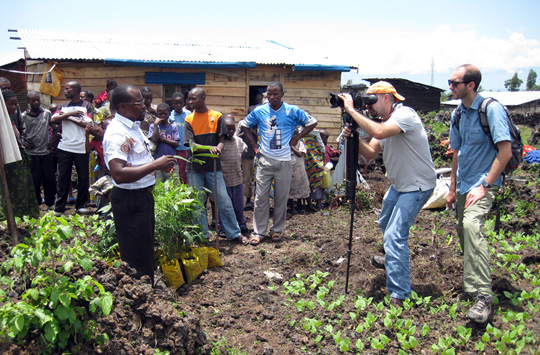
Editor’s Note: This interview originally appeared on Ebony.com. Journalist Rebecca Carroll sat down with Enough Project’s Robert Padavick to discuss the making of Raise Hope for Congo’s new video series, “I Am Congo,” and the motivation behind it.
A few weeks ago, I had the opportunity to interview the extraordinary Congolese activist Amani Matabaro, whose work as Executive Director of Actions pour le Bien être de la Femme et de l'Enfant au Kivu, or Action Kivu, helps women and other victims of violence in the Democratic Republic of Congo reconstruct their lives and reengage with a sense of community. Matabaro is one of the five voices featured in "I Am Congo," a new video series released by the Washington, DC-based nonprofit Enough Project, whose Raise Hope for Congo campaign advocates for the human rights of all Congolese citizens, and works toward ending the horrendous war in eastern Congo. I talked with Enough Project's content director, Robert Padavick, about the making of the video series, and why it's important for it to go viral.

EBONY: How did you come up with the idea for the "I Am Congo" video series?
Robert Padavick: We began with a simple goal: highlight voices from the region. We wanted to create a connection on a human level with the people living there amid the deadliest war in the world—to present the full picture of the Congo, in the voices of those living and working there. We also realized that by and large, mainstream media isn't covering the issue, which actually creates an opportunity for organizations such as ours to fill the void with storytelling of our own.
EBONY: The "I Am" message has been used in many social activist campaigns (I Am Trayvon; I Am African )—what do you think it is about this idea that we are all the same that resonates for people? Particularly, as we are not.
RP: In this case, we hope it reminds people that while eastern Congo is home to the deadliest war in the world, that's not the whole story. It's a multi-faceted place, where natural beauty collides with decay and humanity coexists with war. The "I Am Congo" concept is meant to illustrate, again, that these are stories about people who call the Congo home, in their own words.
EBONY: What struck me most when I interviewed Amani, and what I see in the other people profiled in the series, is a sort of intuitive grace, an elegant simplicity—I see so few Americans with such self-awareness. Do you believe that their experiences have made them who they are, or is it the legacy of their culture?
RP: That juxtaposition really struck me when we were filming the series. Crushing poverty and conflict are so pervasive in eastern Congo. Yet the people we meet in "I Am Congo," and many others there, are so full of humanity. In the region, many people get ahead by embracing the status quo of corruption and conflict. Amani and the other Congolese we profile are fighting that trend, and there certainly is something special within each of them that led them to make this choice.
EBONY: If this video series goes viral, what does that mean for the Congo and the Enough Project in real terms?
RP: This all about highlighting Congolese voices. We hope that the more people see these stories, the more they'll become involved in the issue, and demand greater engagement from policy makers and business leaders— in the region and in the US—to work for a permanent peace in Congo.
EBONY: What is the most important thing that people should know about what's going on in the Congo right now?
RP: That they are connected to the conflict, and therefore can play a role in helping end it. A main driver of the conflict is the trade in "conflict minerals," which are essential elements in electronics products we use every day—laptops, smart phones. It's a multi-million dollar trade, and militias are fighting to control the profits. We need to increase consumer pressure on electronics companies to clean up their supply chains and produce products containing conflict-free minerals from the Congo.
Check Out the "I Am Congo" Video Series.
Photo: The making of "I Am Congo" in Goma, Democratic Republic of the Congo. Robert Padavick and cameraman Jeff Trussell interview Fidel Bafilemba, one of the five Congolese profiled in the video series (Enough Project).

